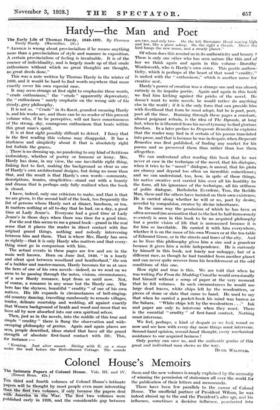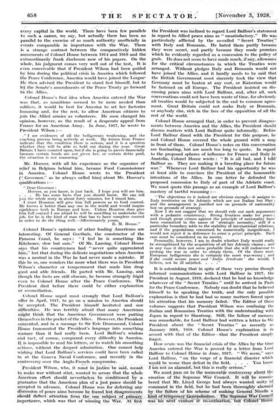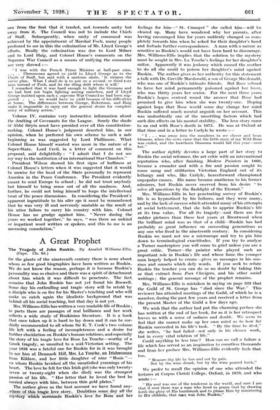Colonel House's Memoirs
The Intimate Papers of Colonel House. Vols. III. and W. (Ernest Beim. 42s.) THE third and fourth volumes of Colonel House's intimate Papers will be thought by most people even more interesting than the first two volumes, if only because the papers deal with America- tfie- War: The- first two volunies were Published early in 1926, and the considerable gap between
them and the new volumes is amply explained by the necessity of winning the permission of statesmen all over the world for the publication of their letters and memoranda.
There have been few parallels to the career, of Colonel House. The unofficial partner of President WiLson, he was indeed almost up to the end the President's alter ego, and his influence, sometimes a decisive influence, penetrated into every capital in the world. There have been few parallels to such a career, we say, but actually there has been no parallel to the exercise of so much authority unofficially in events comparable in importance with the War. There is-a: strange contrast between the comparatively hidden Movements of Colonel House between 1914 and 1919 and the extraordinarily frank disclosure now of his papers. On the whole, his judgment comes very well out of the test, It is
even conceivable that if President Wilson had been guided by him during the political crisis in America which followed
the Peace Conference, America would have joined the League' He then advised the President to stand fast himself, but. to lei .the Senate's amendments of the Peace Treaty go forward t the Allies.
Colonel House's first idea when America entered the War was that, as munitions seemed to be more needed than soldiers, it would be best for America to set her factories
hamming and, for the rest, to allow American citizens to join the Allied armies. as volunteers. He soon changed his opinion, however, as the result of a desperate appeal from France for an American Army. In June, 1917, he wrote to President Wilson :—
t" I see evidences of all the belligerents weakening, and the cracking process being actively at work. My letters from France indicate that the condition there is serious, and it is a question whether they will be able to hold out during the year. Great Britain I have counted upon, but if she is going to pieces financially because certain funds are not given her, or certain debts paid, the situation is not reassuring."
-Mr. Hoover, with all his experience as the organizer of relief in Belgium behind him, became Food Commissioner in America. Colonel House wrote to the President Governor," as he always called him) about Mr. Hoover's qualifications :-
" Dear Governor : • • Hoover, as you know, is just ba-ck. I hope you will see him.
_ . . . He hai some facts that you should know. He can tell yOu the whole story in about forty minutes, for I timed MM.
-I -trust Houston will give him full powers as to food control. Re knows it better than any one in the world and would inspire coenfidence both in Europe and here. Unless Houston does give hum-full control I am afraid he will be unwilling to undertake the jab; for he is the kind of man that has to have complete control it; order to do the thing well.--Affectionately yours,
E. M. House."
Colonel House's opinions of other leading Americans are interesting. Of General Goethals, the constructor of the Pitnama Canal, he says : " I feel he is something like Kitchener, slow but sure." Of Mr. Lansing, Colonel House says that his countrymen had' "never quite appreciated him," but that during the delicate negotiations when-America Was a neutral in the War he had never made a mistake. If this be so, one wonders the more what there was-in President Wilson's character or temperament that made him drop good and able friends. He parted with Mr. Lansing, and though the facts are still obscure, he became strangely frigid even to Colonel House after the Peace Conference. The President died before there could be either explanation or reconciliation.
colonel House urged most strongly that Lord Balfour's offer in April, 1917, to go on a' mission to America should be' accepted: The President himself hesitated and saw difficulties. He was terribly afraid -that many Americans
night think that the American Government were putting -themselves in the pocket of the Allies. However, the President cOnsented, and in a message to Sir Eric Drummond, Colonel House transmuted the President's language into something warmer than it had really been. Lord Balfour's . wisdom and tact, of course, conquered every difficulty in America. It is impossible to read his letters, or to watch his smoothing actions, without the deepest admiration. One cannot help wishing that Lord Balfour's services could have been called in at the Geneva Naval Conference, and recently in the controversy over the Anglo-French compromise.
President Wilson, who, it must in justice be said, meant .
to make war without stint, wanted to secure that the whole -American effort should nevertheless be Conditioned toy a guarantee that the American plan of a just peace should be accepted in advance. Colonel House was for deferring any discussion of peace aims because he feared lest disagreements should defleetlatteation: from the one subject_of .primaDr,.• importance, which was that of winning the War. At first
the President was inclined to regard Lord Balfour's statement
in regard to Allied peace aims as " unsatisfactory." He was particularly afflicted by the so-called " Secret Treaties'," with Italy and Rumania. He hated them partly because they were secret, and partly because they made promises Which he evidently regarded as a concession to the policy of grab. He does not seem to have made much, if any, allowance for the critical circumstances in which the Treaties were arranged. Without pledges Italy and Rumania would not have joined 'the Allies, and it hardly needs to be said that the British Government most sincerely 'took the view that Germany must be beaten at any cost, or Kaiserism would be fastened on all Europe. The President insisted on dis- cussing peace aims with Lord Balfour, and, after all, such conversations could not have been waste of time, for obviously all treaties would be subjected in the end to common agree- ment. 'Great Britain could not make Italy or Rumania, or anybody else, rich in the face of the opposition of all the rest of the world. '
Colonel House arranged that, in order to prevent disagree- ments between America and the Allies, the President should discuss *matters with Lord Balfour quite informally. Before Lord Balfour dined with the President for this purpose, he and Colonel House covered the whole ground with a map in front of them. Colonel House's notes on this conversation are fascinating, but are much too loiag to qnote. In regaid
to the proposed spheres of influence for France and Italy in Anatolia, Colonel House wrote : " It is all bad, and I tql4f--
Balfour so. They are making it a breeding place for future
war." Whenever Lord Balfour had his opportunity he was at least able to convince the- President of the honourable
intentions of the Allies. In one letter he defended the proposed concession to Italy of part of the Adriatic emit. We must quote this passage as an example of Lord Balfour's mastery of tactful reasoning :--
" The objections to it indeed are obvious enough—it assigns to Italy territories on the Adriatic which are not Italian but Slav ; and the arrangement is justified not on grounds of nationality but on grounds of strategy. • •
Now I do not suggest that we should rule out such arguments -= with a pedantic consistency. Strong frontiers make for peace ;- and though great crimes against the principle of nationality have been committed in the name of strategic necessity,' still if a particular boundary adds to the stability of international relations, and if the populations concerned be numerically insignificant, I would not reject iti in deference to• soine-a priori principle. Eacli case must be considered on its merits.
Personally, however, I am in doubt whethei Italy would really be strengthened by the acquisition of all her Adriatic claims ; and - in any case it does not seem probable that she will endeavour to prolong the war in order to obtain them. Of the three west- European belligerents She is certainly -the most war-weary ; and if she could secure peace and Italia Irredenta' she would, I
believe, not be ill, satisfied. . ."
It is astonishing that in spite of these very precise though informal communications with Lord Balfour in 1917, the President in August, 1919, declared that he had no knowledge whatever of the " Secret Treaties " until he arrived in Paris for the Peace Conference. Nobody can doubt that he believed himself to be speaking the truth, and the only possible explanation is that he had had so many matters forced upon
his attention that his memory failed.-- The Editor of these volumes 'suggests that President Wilson was confusing the Italian and Rumanian Treaties with the understanding with
Japan in regard to Shantung. Still, the failure of memory was remarkable, for Lord Balfour had written a letter to the President about the " Secret Treaties " as recently as January 30th, 1918. Colonel House's explanation is in accord with that of the Editor—that the President simply forgot.
How acute was the financial crisis of the Allies by the time
America entered the War is proved by a •letter, from Lord Balfour to Colonel HOtise in June, 1917. " We seem," says
Lord Balfour, " on the verge of a financial disaster which would be worse than defeat in the field. . . . You know I am not an alarmist, but this is really serious."
Wemust.pass on to the memorabje controversy. about the creation *of the Supreme War Council. It will be remetr' bered that Mr. Lloyd George had always wanted unity of command in the field, but he had been thoroughly alarmed by the failure of his scheme of making General Nivelle a
kind of ti&ary Gen'tilissimo.• The Supreme War Council was eii
his next venture it ZOIOWnitifiCifi; to1OtTeeliOnsrt saw 'front the first that 4t tended, not-towards unity but away from it. The Council was not to include the Chiefs of Staff. Subsequently, when unity of command was achieved by the appointment of Marshal Foch, many people
professed to see in this the culmination of Mr. Lloyd George's efforts. Really the culmination was due to Lord Milner and to Lord Haig, and Colonel House's comments on the Supreme War Council as a means of unifying the command are very shrewd :—
"I was with the French Prime Minister at half-past nine. . . Clemenceau agreed to yield to Lloyd George as to the Chiefs of Staff, but said with a sardonic smile, ' It vitiates the entire plan. What I shall do is to put on a second- or third rate man instead of Foch, and let the thing drift where it will.'
I remarked that it was hard enough to fight the Germans and we had best not begin fighting among ourselves, and if Lloyd George insisted upon such a supreme War Council as had been sug- gested . . . we would have to yield because of his difficulties at home. The differences between George, Robertson, and Haig make it impossible to carry out the general desire for complete unity of military action."
Volume IV. contains very instructive information about the drafting of Covenants for the League. Surely the shade of Abbe Sieyes must have presided over all this constitution- making. Colonel House's judgment deserted him, in our opinion, when he preferred his own scheme to such a safe beginning as was suggested by Lord Phillimore. What Colonel House himself wanted was more in the nature of a Super-State. Lord Cecil, in a letter of comment on this proposal, said delightfully : " I admit that I do not see
my way to the institution of an international Star Chamber." President Wilson showed his first signs of huffiness at Colonel House's letters when it was suggested that it would be unwise for the head of the State personally to represent America in the Peace Conference. The President evidently meant to send Europe to school ; he did not trust anybody but himself to bring sense out of all the madness. And,
further, he could not bring himself to forgo the intellectual treat of the peace discussions. In considering-the President's apparent ingratitude to his alter ego it must be remembered
that he was very ill and nervously unstable as the result of his utter failure to carry his country with him. Colonel House has no grudge against him. " Never during the years we worked together," he says, " was there an unkind or impatient word written or spoken, and this to me is an unceasing consolation."




















































































































 Previous page
Previous page